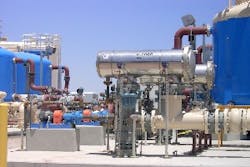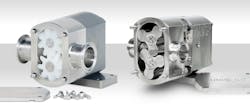The EPA’s new standards for upper limits of arsenic levels in drinking water is now being enforced and many municipalities have been mandated to install arsenic removal technologies as a component of their primary water treatment facilities. The type of medium used to remove arsenic from water is very costly and has a typical life span of approximately 18 months. An example of such a project is the Hueco Bolson facility outside of El Paso, Texas. With a flow rate of 3,200 gpm, the arsenic medium replacement cost is approximately $1 million in just under 18 months. Without pre-filtration, the medium’s life expectancy may be reduced by as much as 25 to 40 percent.
Therefore, incorporating the use of pre-filtration to remove particulate, thereby extending the life of the medium, provides a tremendous cost saving benefit. It is a recognized fact that well water contains particulate, even a relatively small ppm (volume of particulate) can build up in the medium in a relatively short period of time. The example mentioned above, water flowing through the arsenic medium at 3,200 gpm with a particle load of just 15 ppm, results in approximately 24 pounds of debris in one hour.
Even if the system runs 50 percent of the time, this is almost 80 tons of debris that will be captured in the arsenic medium over the same 18-month period. One very cost effective solution to extending the life of the arsenic medium is to provide self-cleaning screen filtration as a, which has a proven record of providing an efficient means of particulate removal.
Self-cleaning screen filtration checklist of features includes:
- Uninterrupted filtration during the cleaning process.
- Low flushing flow rates in the range of 5 to 10 percent of the filter’s total flow rate. Low flushing flow rates as a percent of total flow minimizes pressure fluctuations in arsenic removal systems.
- Short duration cleaning cycles of 15 seconds results in less wastewater.
- “True” continuous flush cycles eliminates pressure fluctuations that result from frequent opening and closing of flush valves during periods when heavy ppm loading occurs.
- Simplicity for ease of maintenance.Minimum number of moving parts and simpler controls results in less maintenance.
- 50 micron filtration is the most common filtration degree for pre-filtering well water for arsenic removal systems.
Conclusion: Pre-filtration with self-cleaning screen filters have become a standard for arsenic removal systems, and are also commonly used for a variety of other membrane or medium filtering technologies. End users are requiring pre-filtration be supplied prior to other filtering or water treatment technologies due to the exceptional ROI in cost savings. Pre-filtration is commonly added to UV systems to significantly alleviate “shadowing” organisms targeted by the UV, as well as to cartridges and bag filters to extend the life and reduce the cartridge/bag change frequency. Therefore, purchasing self-cleaning screen pre-filtration to other filtering or water treatment technologies is commonly a financially sound decision.



